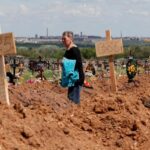
* Some of Hezbollah’s oldest allies lose seats
* Final results expected later on Monday
* Saudi-aligned Lebanese Forces gains ground
* Parliament more fragmented, clearing way for deadlock (Adds quotes, Iran reaction)
By Laila Bassam, Timour Azhari, Maya Gebeily and Tom Perry
BEIRUT, May 16 (Reuters) – Iran-backed Hezbollah and its allies are likely to lose their majority in the Lebanese parliament after Sunday’s election, three sources allied to the group said, in a major blow to the heavily armed faction that reflects anger with ruling parties.
Analysts said this could lead to political deadlock and conflict as deeply divided factions hash out powersharing deals over top state positions, risking further delays to reforms that are needed to address the economic crisis and unlock donor aid.
Opponents of Shi’ite Muslim Hezbollah including the Saudi-aligned Lebanese Forces (LF), a Christian group, and reform-minded newcomers scored significant wins in the election, the first since Lebanon’s devastating economic meltdown and a huge port explosion that rocked Beirut.
While results from Sunday’s election have yet to be finalised, the senior sources said it was improbable Hezbollah and its allies would secure more than 64 of parliament’s 128 seats, citing preliminary results.
The sources spoke on the condition of anonymity because they were not authorised to speak on behalf of Hezbollah and its allies and a Hezbollah spokesman could not be reached for comment.
Hezbollah and its allies won a majority of 71 when Lebanon last voted in 2018, pulling Lebanon deeper into the orbit of Shi’ite Muslim-led Iran.
Sunday’s result could open the door for Sunni Muslim-led Saudi Arabia to exercise greater sway in Beirut, long an arena of its rivalry with Tehran.
Iran on Monday said it respected the vote and had “never tried to interfere in Lebanon’s internal affairs.”
A spokesman for the LF said Hezbollah and its allies had lost their parliamentary majority but that no one grouping now appeared to have a majority.
The result leaves parliament fractured into several camps and more sharply polarised between Hezbollah’s allies and opponents, who are not currently united into a single bloc.
Jamil al-Sayyed, an MP close to Hezbollah who retained his seat, told Reuters the result would lead to an increasingly dysfunctional political system.
A failure to pull together a homogenous parliamentary majority raised the spectre of “social implosion or civil war, unless foreign powers intervene,” said Sayyed.
“MAJOR BLOW”
In one of the most startling upsets, Hezbollah-allied Druze politician Talal Arslan, scion of one of Lebanon’s oldest political dynasties first elected in 1992, lost his seat to newcomer Mark Daou, according to the latter’s campaign manager and a Hezbollah official.
Initial results also indicated wins for at least five other independents who campaigned on reform and accountability for politicians blamed for steering Lebanon into the worst crisis since its 1975-90 civil war.
Among the expected newcomers is opposition candidate Elias Jradi, who won an Orthodox Christian seat, in the only breakthrough in Hezbollah’s traditional stronghold of southern Lebanon.
The LF meanwhile won at least 20 seats – up from 15 in 2018, said the head of its press office, Antoinette Geagea.
The gains would allow it to overtake the Hezbollah-allied Free Patriotic Movement (FPM) as the biggest Christian party in parliament, a title the latter has held since 2005.
Founded by current President Michel Aoun, the FPM won up to 16 seats, the head of its electoral machine told Reuters, down from 18 in 2018.
“Hezbollah’s Christian allies have lost the claim to represent the majority of Christians,” said Mohanad Hage Ali of the Carnegie Middle East Center, describing it as a “major blow” to the Shi’ite group’s claim of having cross-sectarian support for its powerful arsenal.
Hezbollah and its ally, the Amal Movement of Parliament Speaker Nabih Berri, swept all the seats reserved for their Shi’ite Muslim sect, according to preliminary numbers from both parties.
It remains to be seen whether Hezbollah allies scooped up seats left empty by the withdrawal of leading Sunni politician Saad al-Hariri.
The next parliament must elect a speaker – a post held by Berri since 1992 – before nominating a prime minister to form a cabinet. Lawmakers are due to elect a president to replace Aoun, whose term ends on Oct. 31.
Any delay in cabinet formation may further postpone reforms required to unlock support from the International Monetary Fund and donor nations.
(Reporting by Laila Bassam, Timour Azhari, Maya Gebeily and Tom Perry; Additional reporting by Lina Najem; Writing by Tom Perry and Maya Gebeily; Editing by Ed Osmond, Hugh Lawson and Frank Jack Daniel)




